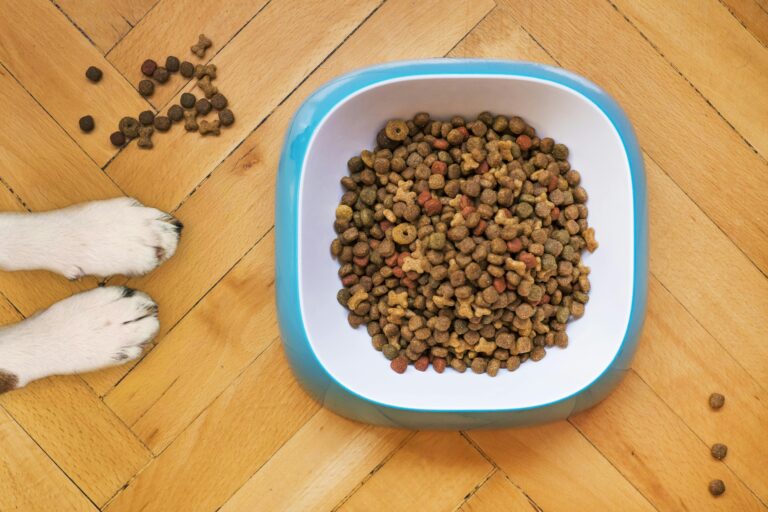
It’s a question many pet owners ask: why are grapes bad for dogs? Unfortunately, grapes can be highly toxic and even poisonous to dogs.
Eating grapes can cause severe health issues in dogs, and even lead to death.
In this blog post, we will explore the dangers of grape toxicity and poisoning in dogs.
And why it’s crucial to keep your pup away from grapes due to their potential health risks.
Can Dogs Eat Grapes?
A lot of people ask this question, can they? No, dogs should not eat grapes or raisins for that matter.
While these foods may be safe for humans to eat, they can be toxic to dogs and cause serious health problems.
Grapes and raisins are highly toxic to dogs, regardless of breed or age. Even small amounts can lead to severe health conditions.
The toxin responsible for grape toxicity can cause devastating effects.
Why Are Grapes, Bad For Dogs?
Grapes contain a highly toxic substance called persin, which is toxic to dogs.
Grapes can be found in a variety of foods, including raisins and certain types of candy and baked goods.
It is best to avoid giving your dog food or treats that contain grapes in any form.
How Do Grapes Impact Dogs?
If a human ingests grape, they are usually digested and eventually expelled. The same cannot be said for dogs.
Ingesting grapes are harmful for dogs which can cause their stomach to swell and possibly rupture, leading to death in some cases.
The skin of grapes contain compounds that can cause kidney failure and other health issues.
Dogs are particularly vulnerable to the toxicity of grapes, so it is important to keep them away from any grape products or plants.
While most dogs may not experience issues from eating a few grapes, consuming them in large quantities can be dangerous.
It is important to understand why are grapes bad for dogs so that you can protect your beloved pet from these potential dangers.
Both toxicity and poisoning from grapes and raisins can harm dogs, but they are not the same.
Toxicity refers to the harmful effects of ingestion, while poisoning occurs when symptoms escalate, often leading to kidney failure.
Understanding the differences can help dog owners act quickly.

Grape And Raisin Toxicity
Toxicity occurs when a dog consumes grapes or raisins, leading to harmful effects. Symptoms usually appear within hours or days after ingestion.
Some dogs eat a single raisin and get seriously sick, while others eat a handful and seem fine (though it’s never worth the risk).
It is important to note that not all dogs are affected by grapes and raisins, but it is best to avoid giving them to your pet.
Symptoms of Grape or Raisin Toxicity in Dogs
It is important to know the early signs of grape toxicity in dogs, as well as how to prevent it.
According to the Merck Veterinary Manual, common symptoms include:
- Vomiting – Often the first symptom, sometimes containing pieces of grapes or raisins.
- Diarrhea – May develop soon after eating the fruit.
- Loss of Appetite – The dog may refuse food or show disinterest.
- Lethargy – A noticeable drop in energy levels.
- Increased Thirst – Dogs may drink more water than usual.
- Dehydration – Signs include dry gums and reduced skin elasticity.
- Abdominal Pain – Dogs may whimper or react when their stomach is touched.
If a dog eats grapes or raisins, even without symptoms, immediate veterinary attention is essential.

by cynoclub | unlimphotos
Grape and Raisin Poisoning
When a dog consumes a toxic dose, the effects can escalate into grape and raisin poisoning.
Poisoning refers to the severe health effects resulting from grape or raisin ingestion, particularly acute kidney failure.
Symptoms can appear within 24 to 48 hours and require urgent veterinary care. This condition can be life-threatening if not treated promptly.
Symptoms of Grape and Raisin Poisoning?
The symptoms of grape poisoning in dogs can vary from mild to severe.
- Acute Kidney Injury – Damage occurs within 24 to 48 hours.
- Oliguria or Anuria – Reduced or completely halted urine production.
- Uremic Breath – A strong, fishy odor from the mouth due to kidney failure.
- Seizures – In severe cases, neurological issues may develop.
- High Blood Pressure – Can result from kidney damage and worsen the condition.
In some cases, the dog’s neck may become swollen due to the presence of tartaric acid in green grapes.
Both toxicity and poisoning require urgent veterinary attention. If your dog eats grapes or raisins, act immediately.
The sooner treatment begins, the better the chances of recovery. This is why grapes are bad for dogs—even small amounts can have dangerous consequences.
How to prevent this toxicity or poisoning?
- Keep grapes and raisins out of reach: Store them in secure containers and high shelves.
- Educate family members: Ensure everyone in the household knows why grapes are bad for dogs.
- Avoid sharing food with grapes or raisins: Double-check snacks before offering them to your pet.
- Monitor children’s snacks: Kids might unknowingly drop or offer grapes to dogs.
- Check ingredient lists: Some baked goods, cereals, or trail mixes may contain raisins.
- Train dogs with “leave it” commands: Teaching this can prevent accidental ingestion.
- Act immediately if ingestion occurs: Contact a vet as soon as you suspect your dog ate grapes or raisins.
Treatment:
Depending on the amount ingested, clinical signs may appear within a few hours or up to 24 hours later.
Vets will assess the amount of grapes ingested and the size of the dog in order to determine if there is a well-established toxic dose.
They recommend inducing vomiting if the ingestion occurred within two hours prior to presentation at the vet’s office.
They may also check for pale gums and other signs of toxicity such as an elevated heart rate or lethargy.
Immediate treatment for grape toxicity may include intravenous fluids, medications to protect the kidneys, and blood work to monitor the health of the dog.
Activated charcoal may also be given in order to reduce the absorption of toxins from the dog’s stomach and intestines.
By being aware of grape toxicity in dogs and taking precautions such as keeping grapes away from your pet’s reach, you can help prevent this potentially fatal condition.
Here Are Some Alternatives To Grapes
By exploring the alternatives available for grapes, you can ensure that your pup is snacking on something safe and healthy!
These alternatives are safe and nutritious for your dog, and they can provide the same benefits as grapes without the potential risks.
From apples to blueberries and carrots to sweet potatoes, there are plenty of options that you can choose from!




